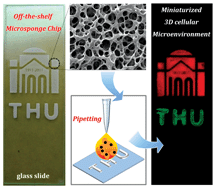The integration of microfabrication and biomaterials enables construction of miniaturized 3D microenvironments with biomimetic micro-architectural and functional features to advance cell-based assays for mechanism investigation of physio/pathology and for prediction of drug responses. However, current biomaterials-assisted constructions of miniaturized 3D cellular microenvironments usually involve cells in the microfabrication process, limiting their wide application in most biomedical labs, where expertise and facilities are not readily available. Here we tackle this challenge by developing off-the-shelf microsponge arrays as pre-formed micro-patterned templates which can separate the microfabrication steps from the cell-handling steps and miniaturize the cell-based assays. The microsponge arrays with tailored microarchitectures (e.g. micropillar/well arrays or bifurcated vascular network) could be stored and delivered to distant locations as ready-to-use chips. The highly porous and microscale sponges enabled automatic and uniform loading of cellular niche components (cells, matrices and soluble factors) by simply pipetting, making it accessible to any lab with basic cell culture setups. Meanwhile, the chips containing miniaturized 3D cellular microenvironments with versatile micro-architectural designs could be integrated (i.e. by autoloading and sandwiching) to enable novel 3D cell-based assays (e.g. discrete gradient-based cytotoxicity test and horizontal 3D invasion assay) in an efficient and parallel manner. The off-the-shelf platform based on microsponge array is expected to be widely applicable across multiple disciplines in cell biology, cell/tissue engineering and pharmacological science.

You have access to this article
 Please wait while we load your content...
Something went wrong. Try again?
Please wait while we load your content...
Something went wrong. Try again?


 Please wait while we load your content...
Please wait while we load your content...